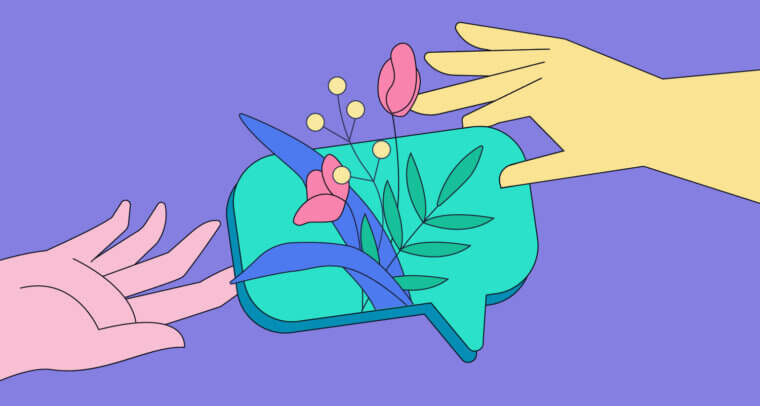
No matter where you go, one question always seems to follow: How are you?
It can be a simple, effective way to start a casual conversation—no lengthy descriptions of your life circumstances required. But it’s also an autopilot phrase—with autopilot responses (such as “fine,” “good,” or “OK”) within easy reach. So if you’re going for a deep or meaningful conversation, this question might not be the best option. The key is understanding when to use the ubiquitous phrase, and when to try a different approach.
9 ways to ask “How are you?”
There are many ways to ask this fundamental question, but how you phrase it can imply different things. For example:
1 How are you? This is polite, but it’s not necessarily a serious inquiry about the other person’s well-being.
2 How are you doing? This is a direct inquiry about how a person is feeling in general.
3 Are you OK? The meaning of this phrase depends on the context. In England, for example, this simply means “How are you?” while Americans may use this phrase to check if someone requires assistance.
4 How’s it going? This is casual. You’re asking how a person’s life has been lately, in a more general sense.
5 What’s up? This is essentially a casual hello.
6 Would you like to talk about X? This is an empathetic inquiry about a potentially sensitive event or aspect of a person’s life—with the built-in option for them to decline.
7 What’s new with you? You want to know what changes have occurred in a person’s life, typically focusing on the positives.
8 It’s been a while! This is a casual acknowledgment of a lengthy absence. It conveys happiness or excitement about your reunion.
9 What have you been up to since we last talked? You’re looking for an overview of what a person has done since your last conversation, and it could be about a problem they were dealing with at the time.
Each of these conveys a different tone, and the results can vary. And using the wrong phrase could come off as awkward—or even insensitive in extreme circumstances. So it pays to know when they work, but especially when they don’t.
When is it appropriate to use variations of “How are you?”
Beyond tone, there are a few factors you should consider when picking the appropriate way to ask “How are you?” For instance:
- Level of familiarity with the person you’re addressing (this dictates how familiar or formal you should be with them)
- General relationship (friend, family member, colleague, acquaintance, etc.)
- Context of the conversation (how long it’s been since you saw them, what you last spoke about, etc.)
- What information you want to know (for example, do you see it as a passing conversation, or do you want a more in-depth dialogue with specific details?)
Let’s say you’re texting a loved one with a chronic health condition. You might message, “How are you doing today?” This speaks directly to what you want to know, and it shows them that you understand that things may shift daily, while leaving it up to them about how detailed they want to get in their response.
Conversely, if you’re emailing or messaging your manager who just got back from parental leave, something slightly more formal and targeted might make more sense, like “How are you doing with the new baby?” That way you show interest in their major life event while keeping things professional.
Here are a few more examples of how to use “How are you?” and its alternatives in conversation:
Situation: Running into an old friend you went to high school with at your ten-year reunion. Key phrase: Hey, how have you been? Why it works: It’s polite, shows interest in their general well-being, and gets to the point (there’s a lot you don’t know, and you want the highlights).
Situation: Chatting with a friendly neighbor you talk to occasionally. Key phrase: How’s it going? Why it works: It shows that you care about them as a person, even if that doesn’t lead to an in-depth conversation about their life.
Situation: DMing a close friend who shares your offbeat sense of humor. Key phrase: What’s up, weirdo? Why it works: It matches the tone of your friendship, keeping things friendly and light.
5 alternatives to “How are you?” in an email
When emailing someone in a professional setting, the way you ask how they are is especially important. Used correctly, it could help you make a good impression or even kick off a constructive, collaborative working relationship. Here are a few options to consider:
1 It was great seeing you at [work conference/event]. Did you see [speaker/presenter]?
Common ground is always a great place to start a conversation—especially in an expansive professional setting where you may not have much in common with everyone. This approach can allow you to make an introduction via email that reminds them where you met (or last saw each other) and provides an opportunity for them to share their experience with a speaker or presenter you found interesting.
2 Welcome to the team! Are you finding your way around the [tool/platform] OK?
Joining a company can sometimes be overwhelming—with lots of paperwork, everything you need to get up to speed with projects, and new coworkers. Then, of course, there’s your actual work. This kind of email message acknowledges that there can be a learning curve with a new job. It also implies the potential for assistance without offering it outright, so they can pursue it if needed.
3 I really appreciated your [Slack message/tweet/LinkedIn post, etc.] about [topic]. Were you able to X?
Follow-ups like this are a great way to start conversations. Unlike a typical “How are you?” they show that you’ve been paying attention to the other person’s activities. And, more than likely, the person will be happy to start a conversation about their work or opinions once you’ve expressed interest.
4 I hope you’re having a great week.
This is a subtle way to recognize that the recipient may have things going on in life or at work that could affect them. Because it’s phrased as a statement rather than a question, it allows the other person to skip the specifics if they don’t want to share personal details.
5 Hi [name],
It’s perfectly acceptable to greet a person via email with their name. After all, sometimes an email is just a quick information exchange.






